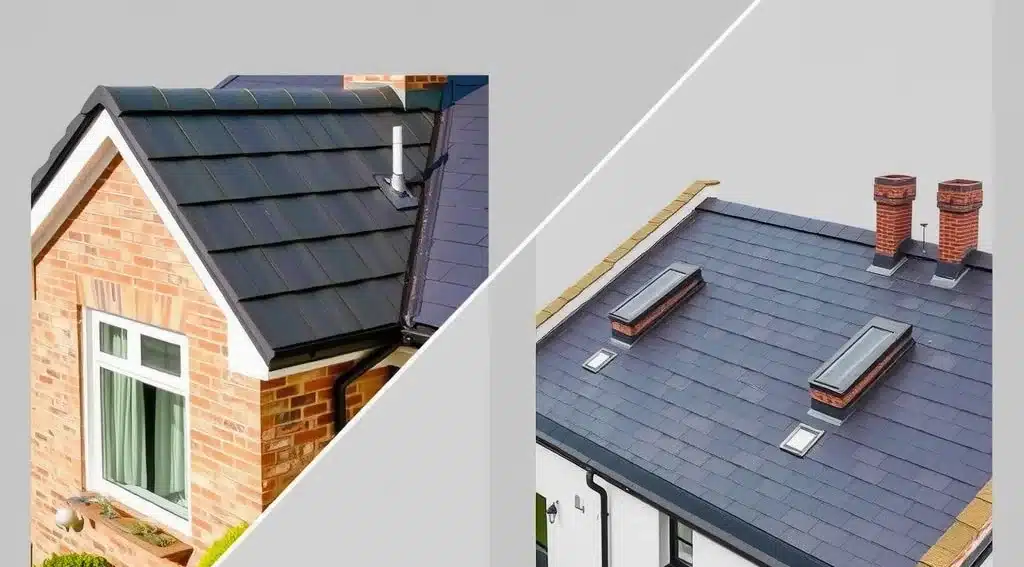Choosing the right roofing material is one of the most important decisions you’ll make during the roof replacement process. This is especially true in New England, where weather conditions can go from sunny skies to snowstorms in a flash.
Two popular options homeowners often weigh are slate roofing and flat roofing. Each has its own unique set of advantages and drawbacks, and what’s best for one home may not be ideal for another.
Let’s take a closer look at the pros and cons of flat and slate roofing so that you can make an informed decision about your home or commercial property.
What Is A Slate Roof?
Slate roofing is made out of natural stone that’s been cut into tiles. It’s one of the oldest and most durable roofing materials out there.
Potential pros and cons are:
- Longevity: A well-installed slate roof can last for over 100 years if properly installed. This is the longest life span of any roofing material, making it a great investment for homeowners looking to stay put or add value to their homes.
- Fire and weather resistant: Slate is naturally fireproof and incredibly resistant to rain, snow, and wind. If you live in an area with unpredictable weather, slate holds up beautifully.
- Appearance: Homeowners are often drawn to slate tiles because of their beauty. Its natural texture and color variations make each roof unique, and it adds serious curb appeal.
- Low maintenance: Slate roofs require minimal upkeep once they’re properly installed. While periodic inspections are still a good idea, you won’t be replacing tiles every few years like with other roofing types.
- Eco-friendly: Since slate lasts so long, it produces less waste over time. Additionally, since it’s a natural resource, there are no chemical processing or synthetic materials.
- Cost: Any roofing contractor will tell you that a major con of slate roofing is the cost. Both the materials and the labor of the installation come with a high price tag.
- Weight: Slate is a very heavy material, and not all homes are structurally equipped to handle the load. Often, additional structural reinforcement is needed, which adds to the overall cost.
- Fragility: While it’s durable, slate can be brittle and crack if stepped on. Installation and repairs require contractors who are experienced in working with this type of material.
- Limited color choices: Though slate is available in a range of beautiful earth tones (like gray, black, and green), it doesn’t offer the wide variety of colors and styles you get with synthetic materials.
What Is A Flat Roof?
Flat roofs are most commonly found on commercial buildings, but they’ve also gained popularity in modern residential architecture. They are horizontal or nearly horizontal surfaces that are usually covered with materials like modified bitumen, EPDM rubber, or TPO membranes. Despite the name, flat roofs usually have a slight pitch to allow for water drainage.
Potential pros and cons are:
- Affordability: Flat roofing systems tend to be more affordable upfront than slate, making them a solid choice for budget-conscious homeowners or businesses.
- Simpler installation process: Flat roofs are typically much quicker and easier to install than slate roofs. Additionally, maintenance, repairs, and inspections are safer and simpler thanks to the walkable surface.
- Space utilization: A flat roof gives you extra real estate. Flat roofs offer usable space for rooftop gardens, patios, or mechanical systems.
- Easier access: Walking on a flat roof for maintenance, cleaning, or even adding rooftop features like solar panels or HVAC units is easier and safer.
- Modern aesthetic: Flat roofs lend themselves to modern and minimalist architectural styles. They often give homes a sleek, contemporary vibe.
- Shorter lifespan: Flat roofs typically last 15 to 30 years, depending on the material used and how often maintenance is performed.
- Drainage problems: Flat roofs do not drain water easily like pitched roofs. Standing water can become a concern, leading to leaks or membrane damage if not properly maintained.
- Insulation challenges: Flat roofs have less attic space, and insulation options can be limited. You’ll probably need to rely on more high-quality insulation materials or invest in additional layers, which can increase costs.
- Higher maintenance needs: Flat roofs typically require more frequent inspections and maintenance to keep them watertight and functioning properly.
- Not ideal for heavy snow: New England winters can be rough. Without proper design, flat roofs may struggle under the weight of heavy snow accumulation and require regular snow removal.
- Stability issues: While flat roofs can be a great option for smaller homes, they’re not as stable on larger buildings. The weight of the roof can cause larger flat roofs to sag or collapse if not properly supported.
- Limited style options: Flat roofs don’t offer the same variety of styles, textures, or colors as other roofing materials.
Considerations For Choosing A Roofing System
When deciding on roofing materials for your home or business, several factors need to be weighed:
- Budget: Consider not only the initial installation costs but also the long-term maintenance expenses. If you have the budget for a long-lasting roof, slate could be a good investment. For shorter-term solutions, flat roofing may be more practical.
- Architecture of your home: Traditional, historic, or high-pitched homes are typically better for slate. Contemporary, modern, or low-profile homes often favor flat roofing.
- Maintenance preferences: If you prefer minimal upkeep and long-term reliability, slate is likely ideal. If you’re okay with occasional maintenance and enjoy the accessibility, flat roofing may work well for you.
- Climate: Slate performs well in all climates but is especially good in areas with extreme temperatures or fire risk. Flat roofs can struggle in regions with heavy rain or snow unless properly designed with efficient drainage systems.
Need Help Deciding? Contact JP Carroll Roofing Today
If you are unsure which roofing material is right for your home, our roofing professionals are here for you. At JP Carroll Roofing, we have been helping New Englanders choose the right roofing for over 35 years.
We’re happy to walk you through your choices, answer any questions, and find the perfect solution for your roofing needs. Call us or complete the contact form to schedule a free estimate.



